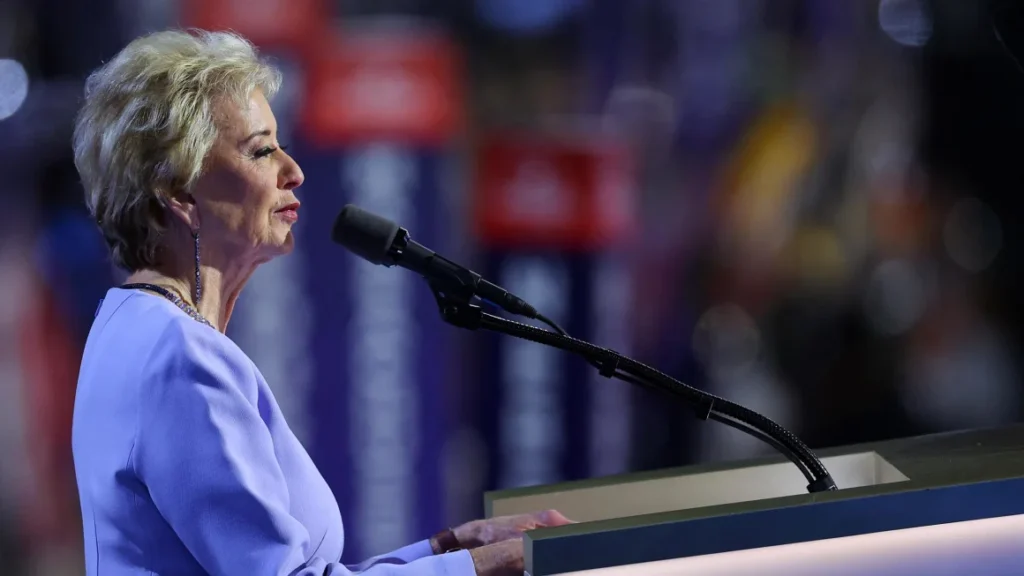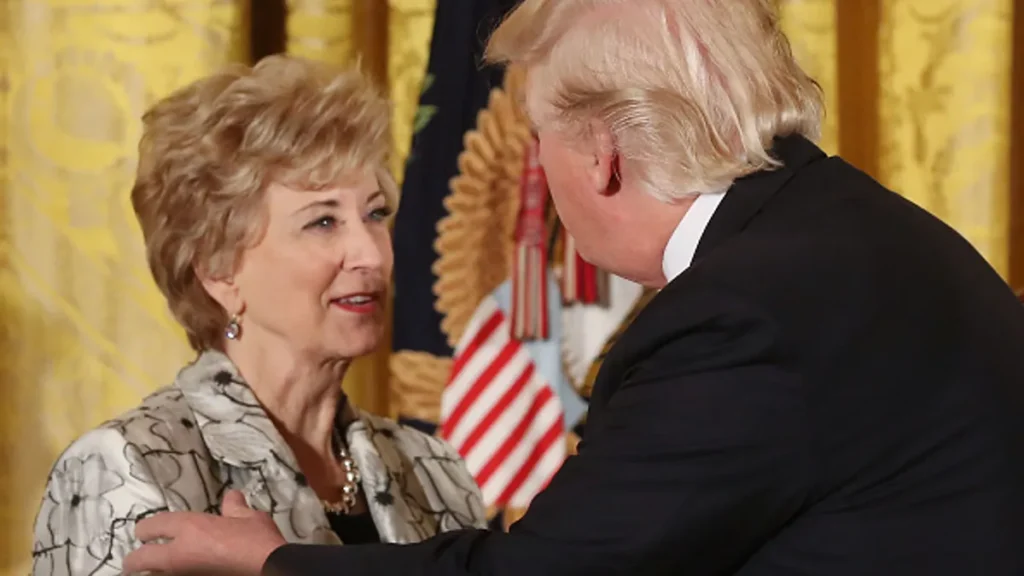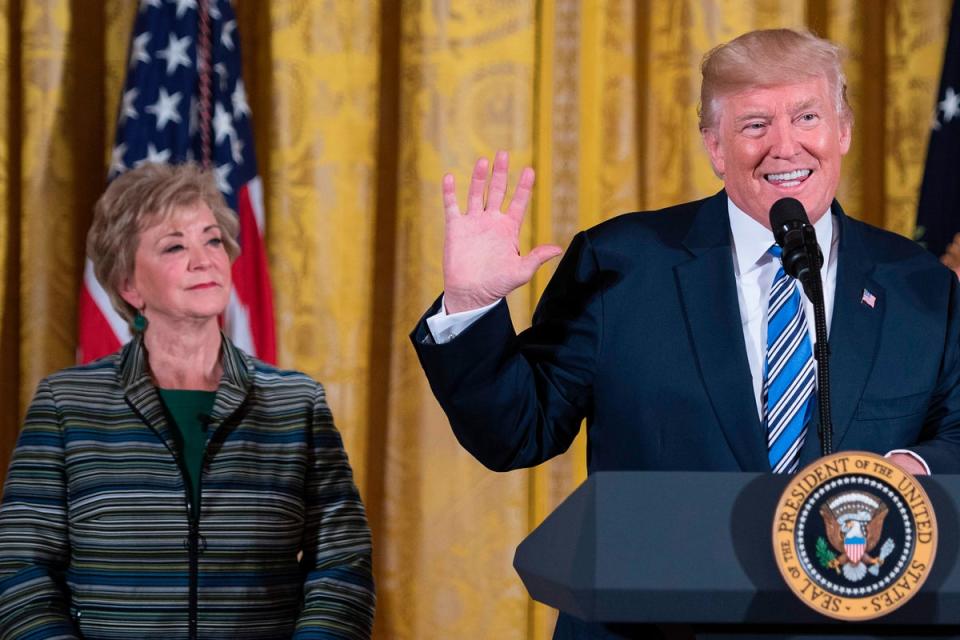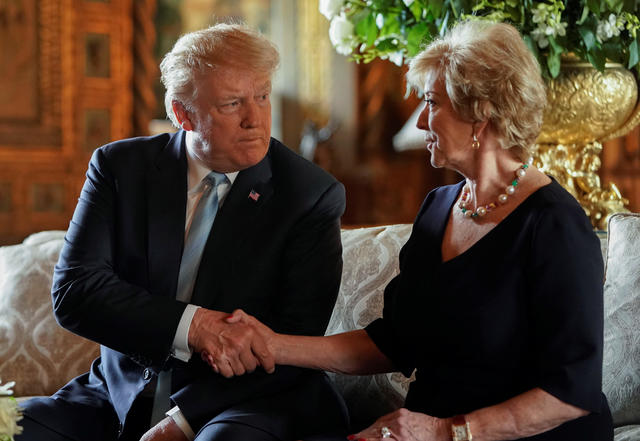President-elect Donald Trump has chosen Linda McMahon, his transition co-chair, to be the next Secretary of the Department of Education. Trump announced this decision on Tuesday night, confirming earlier reports from CNN. McMahon’s selection comes after it became apparent that she would not be appointed as Commerce Secretary; Trump named Howard Lutnick, the other transition co-chair, to that position earlier the same day.

Instead, a more feasible approach may involve reallocating some of its programs to other federal entities. Many Republicans aim to decrease federal involvement in local education, potentially maintaining funding while offering states and schools more autonomy.
Under McMahon’s leadership, the department may use formal regulatory processes to reverse changes made during the Biden administration regarding Title IX, which aimed at expanding protections for LGBTQ+ students. New regulations could align with Trump’s campaign messaging against transgender students participating in girls’ sports.
McMahon co-founded WWE with her husband, Vince McMahon, and played a key role in evolving the company into a publicly traded media powerhouse, stepping down as CEO in 2009. She has unsuccessfully run for the U.S. Senate in Connecticut twice, self-financing her campaigns with substantial personal investments. During Trump’s first campaign, she contributed over $7 million to pro-Trump super PACs.

In Trump’s announcement on Truth Social, he expressed, “It is my great honor to announce that Linda McMahon, former Administrator of the Small Business Administration, will be the United States Secretary of Education.” He emphasized her commitment to educational choice and empowering parents to make informed decisions for their children’s education.
The Department of Education, established in 1980, aims to promote student achievement and ensure equal access for all students. Former Secretary Betsy DeVos highlighted the opportunity for Trump to significantly reshape the department, suggesting that power be decentralized to allow for better local governance in education.
Trump Appoints Linda McMahon as Secretary of Education: A New Era for American Education Policy
President-elect Donald Trump has officially appointed Linda McMahon, a familiar figure in Republican circles and a significant donor to conservative causes, as the next Secretary of the Department of Education. This decision marks a pivotal moment in the Trump administration’s approach to education, as McMahon aims to bring her extensive business experience and commitment to educational reform to the forefront.

Linda McMahon’s Background and Experience
Linda McMahon is best known for her role as co-founder and former CEO of World Wrestling Entertainment (WWE), where she played a crucial role in transforming the company into a global entertainment powerhouse. Under her leadership, WWE expanded beyond wrestling into mainstream pop culture, showcasing her ability to navigate complex business landscapes.
Her experience extends beyond the wrestling industry; McMahon served as the Administrator of the Small Business Administration (SBA) from 2017 to 2019, where she focused on promoting entrepreneurship and supporting small businesses across the country. This role afforded her insight into the challenges faced by American workers and families, a perspective she intends to leverage in her new position.
Educational Reform Agenda
With a strong proponent of educational choice, McMahon’s appointment signals a potential shift in how federal education policies will be implemented. Trump has long advocated for expanding school choice programs, including charter schools and voucher systems, allowing parents greater autonomy in selecting educational pathways for their children.
In his statement, Trump emphasized that McMahon would work to “expand ‘Choice’ to every State in America” and “empower parents to make the best education decisions for their families.” This initiative aligns with a broader Republican strategy to decrease federal oversight in education and enhance local control.
Challenges Ahead
Despite the ambitious goals outlined by Trump and McMahon, there are significant challenges that lie ahead. The Department of Education plays a critical role in administering federal funding to nearly every public school and overseeing the $1.6 trillion student loan portfolio. Any attempts to dismantle or significantly reduce the department’s influence would encounter substantial hurdles, including legislative obstacles and pushback from various stakeholders.
Moreover, McMahon faces the complexities of realigning existing programs and funding mechanisms to ensure that education funding is more accessible and less bureaucratic. Many conservatives advocate for block grants that would allow states to manage education funding more effectively, but this approach would require careful planning to avoid exacerbating disparities in educational access and quality.

Potential Policy Changes
Under McMahon’s leadership, the Department of Education may revisit some policies enacted during the Biden administration, particularly regarding Title IX, which aimed to enhance protections for LGBTQ+ students in educational environments. Trump’s previous campaign rhetoric indicated a desire to restrict transgender athletes from participating in girls’ sports, a topic that is likely to shape discussions within the Department.
Additionally, McMahon’s ties to the America First Policy Institute and her history as a significant Republican donor suggest that her policies may closely align with Trump’s vision for education, prioritizing initiatives that echo conservative values and principles.
Conclusion
As McMahon prepares to take the helm of the Department of Education, her appointment presents an opportunity for transformative changes within the American education system. However, the success of her initiatives will depend on navigating the intricate political landscape, addressing the diverse needs of students and families, and implementing policies that promote equity and access in education.
The implications of her leadership will be closely monitored as America confronts ongoing debates about the role of the federal government in education, the importance of public versus private schooling, and the future of educational equity for all students.


